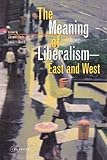The Meaning of Liberalism - East and West / ed. by Jiří Musil, Zdeněk Suda.
Material type: TextPublisher: Budapest ; New York : Central European University Press, [1999]Copyright date: 2000Description: 1 online resource (281 p.)Content type:
TextPublisher: Budapest ; New York : Central European University Press, [1999]Copyright date: 2000Description: 1 online resource (281 p.)Content type: - 9789633865019
- 320.51/3 22/eng/20230216
- online - DeGruyter
| Item type | Current library | Call number | URL | Status | Notes | Barcode | |
|---|---|---|---|---|---|---|---|
 eBook
eBook
|
Biblioteca "Angelicum" Pont. Univ. S.Tommaso d'Aquino Nuvola online | online - DeGruyter (Browse shelf(Opens below)) | Online access | Not for loan (Accesso limitato) | Accesso per gli utenti autorizzati / Access for authorized users | (dgr)9789633865019 |
Frontmatter -- Contents -- Foreword -- Foreword -- The Contemporary State of Liberal Theory -- Citizenship and Moral Individuality -- Liberal Values, Liberal Guilt, and the Distaste far Politics -- Liberalism, Value, and Social Cohesion -- The Value of Liberalism -- Communitarianism in Practice: The Threat to Individual Rights from the Institutionalist Interpretation of the German Basic Law -- Liberalism in the West -- The Limits and the Crisis of Liberal Polities -- Social and Cultural Problems in Contemporary Europe: On Recent Challenges to Liberal Ideas -- Two Dilemmas of Liberalism: Historical Exhaustion and Internal Division in a World of Globalization -- German Difficulties with Liberalism. A Historical Outline -- Liberalism in the East -- The Burdens of the Past -- Liberalism in Central Europe after 1989 -- Can Weak-State Liberalism Survive ? -- Neo-Liberalism, Post- Communist Transformation, and Civil Society -- Constitutional Transformation in Post- Communist Central Europe: A Liberal Revolution ? -- Law, Tradition, and Liberalism in Practice: Quo Vadis, East Central Europe? -- Contributors -- Name lndex
restricted access online access with authorization star
http://purl.org/coar/access_right/c_16ec
The Meaning of Liberalism provides a new perspective on the continuing debate about how liberalism should be defined and what it means in countries with an established parliamentary system, particularly in the new democracies of Central and Eastern Europe. The key question this book addresses is: will the specific experience of communism and its aftermath give birth to a new distinct current of liberal thought, or will it simply enlarge the scope of the Western liberal debate? The authors argue that liberalism cannot be reduced merely to private property and market prices, but needs a very complex set of institutions and corresponding law. Contributors come from both sides of the former Iron Curtain and they highlight the richness and diversity of liberalism and discuss different perceptions of liberal thinking in the East and West in the post-modern world.
Mode of access: Internet via World Wide Web.
In English.
Description based on online resource; title from PDF title page (publisher's Web site, viewed 20. Nov 2024)


